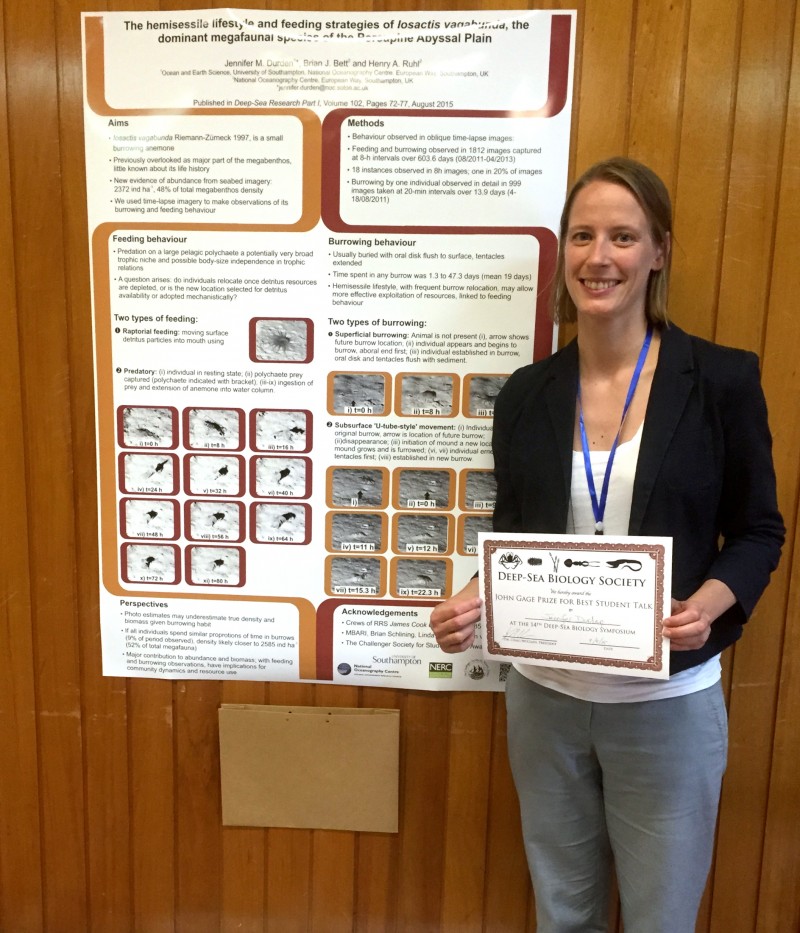Deep-Sea Biology Symposium 2015: Portugual
Jen Durden
NOCS

I would like to thank the Challenger Society for supporting my attendance at the Deep-Sea Biology Symposium 2015 in Aveiro, Portugal through the generous Travel Award. It was a truly memorable and inspiring week!
The highlight of the symposium for me was the opportunity to connect with other deep-sea scientists. My aim was to establish myself within the deep-sea biology community at this symposium. I feel that I met this goal through the dialogs I had with colleagues - past, present, and hopefully future! Over the 5-day symposium, I discussed scientific ideas and learned of new research from leading scientists, and explored opportunities for future work as a post doc.
The presentations of my work were well received. I had many discussions about the two posters (‘The hemisessile lifestyle and feeding strategies of Iosactis vagabunda, the dominant megafaunal species of the Porcupine Abyssal Plain’ and ‘Spatial heterogeneity in the activity of abyssal megafauna’) with researchers in similar fields, some of which generated ideas for future work. My talk entitled ‘The response to food inputs – temporal variation in megabenthic deposit feeding in the abyss ‘ was in the very first slot in the first session of the week, and I was pleased to be asked several questions at the end of my presentation. The icing on the cake of this symposium was being given the John Gage Award for best student talk!
Attendance at this conference has been a vital opportunity to showcase the work I have completed during my PhD, and to learn from deep-sea biologists and ecologists from around the world. I thank the Challenger Society for their support.
Profile:
Jennifer Durden is a final year PhD student in deep-sea ecology at the University of Southampton. Her PhD work has examined spatial and temporal variation in abyssal megabenthic communities, principally using still imagery. The main study site is the Porcupine Abyssal Plain. She has also don research on Station M in the Paicifc, as an intern at the Monterey Bay Aquarium Research Institute in 2014. Before completing an MSc in Oceanography, Jennifer worked as an environmental engineer in Canada, the UK and Egypt.
Tweet:
An awesomely inspiring week in the #deepsea - thanks for your support @challengersoc ! #14DSBS
Latest News
Marine Data Management, Governance and the MEDIN toolset
The Marine Environmental Data and Information Network (MEDIN) and OceanWise are delighted to invite you to attend our popular free online training workshop: ‘Marine Data Management, Governance and the MEDIN toolset’ on the 19th – 23rd of May 2025.
Workshop on the contribution of UK Arctic Ocean science to the International Polar Year 32/33
12:00 11th June – 16:00 12th June 2025: NOC Southampton (In-person with online option): Registration deadline 16th May
REGISTER HERE
Pre-meeting questionnaire (open to all)
The purpose of this workshop is for the UK Ocean Science community to discuss and then draft a prospectus document outlining the priority Arctic research questions the community would like to address during the run up to, throughout and beyond the International Polar Year 32/33. Additionally, to identify what unique strengths and technologies the UK has to help fill these knowledge gaps.
The second day of the workshop will be dedicated to writing groups, one for each of the priority research questions identified - from both the pre-meeting questionnaire (HERE) and day one discussion. By the end of the meeting, each group will have produced draft text and sourced supporting figures for the prospectus.
Post meeting, the draft will be opened for comments and suggestions from everyone, regardless of whether they were able to attend the workshop or not. It will then be shared with UK funders (UKRI, FCDO, DSIT, ARIA) and potential international programmes with whom we would like to collaborate (e.g. Arctic 2050, Norway). It will form a basis from which wider integration with terrestrial, atmospheric and cryosphere communities can be built, e.g. at the UK Arctic Science Meeting in September in Northumbria.
To ensure balanced community and ECR representation, and to ensure that the size of the writing groups is efficient and effective, if the number of registrations from individual institutes becomes overwhelming, we may contact individuals or teams and ask that each institute selects a smaller number of individuals to attend in-person. Please wait for confirmation of in-person attendance before finalising travel arrangements.
The workshop will be open to hybrid attendance and contributions on both days.
Challenger Society Council Position Vacancy
The Challenger Society for Marine Science (CSMS) are pleased to announce an exciting opportunity to support the next generation of ocean scientists and innovators. CSMS are looking for a new Council member to fill the Student Travel Awards and Stepping Stones Portfolio. The successful applicant will administer the travel and research grants available for Early Career Researchers.
The role involves:
- Receiving applications for the two schemes and responding to applicant inquiries
- Soliciting and compiling input from the rest of the Council for assessing the applications
- Communicating with successful and unsuccessful applicants for the two schemes
- Working with the Honorary Treasurer on allocating funds to successful applicants
- Following up with award winners on their reporting requirements
- Attending Council meetings four times a year (in person or online) and contributing to discussions and decision making for CSMS
The usual term for Council members is three years.
For more information about the CSMS Council, please follow this link: https://www.challenger-society.org.uk/The_Council
For more information about our Early Career Researcher grants and awards, please follow this link:
https://www.challenger-society.org.uk/Stepping_Stones
and
https://www.challenger-society.org.uk/Travel_awards
If you are interested in applying or have any questions regarding the role, please contact kathen@bas.ac.uk
